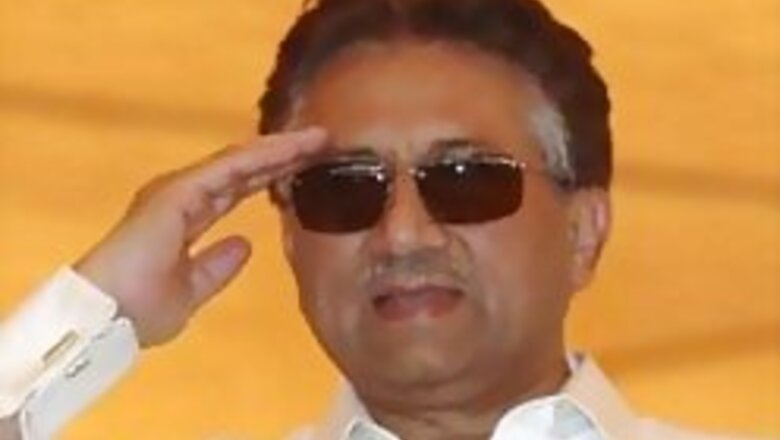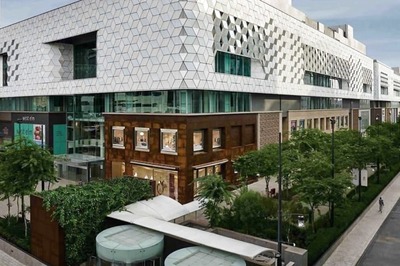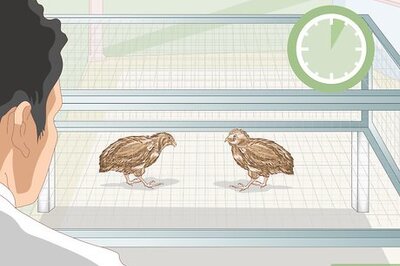
views
Quetta: Key opposition parties of Baluchistan spurned Islamabad's offer for talks on Wednesday to resolve the developing imbroglio in the country's largest province following last month's killing of Baloch leader Akbar Khan Bugti.
The opposition has gathered under the umbrella of the Alliance for Restoration of Democracy (ARD) and the Pakistan Oppressed Nations Movement (PONM).
It includes prominent political outfits like the Baluchistan Nationalist Party (BNP), the Jeay Sindh Quami Mahaz (JSQM), the Jaamat-e-Islami and the Awami National Party to name a few.
The parties have told Islamabad firmly that their conscience and the unfulfilled aspirations of the Baloch people did not permit them to engage in negotiations with the "exploitative" Musharraf regime.
"It will be a travesty of justice if we agree to talks when the people of Baluchistan are in grief over Nawab Akbar Bugti's tragic killing and are suffering due to the misplaced and misguided policies of those in power in Islamabad," said former Baluchistan Chief Minister Akhtar Mengal at a meeting of his BNP supporters.
"Wednesday's crackdown on our activists and the supporters of other opposition parties by the army and the paramilitary forces shows that Islamabad is not interested in helping the Balochis coming out of their present state of underdevelopment nor working for a long-term solution to a decades-old problem," Mengal added.
PAGE_BREAK
The senior Baloch leader's broadside against the federal government came even as a shutter down and a wheel jam strike gathered tempo across Baluchistan in protest against the August 26 killing of Akbar Bugti in a military operation in the Bhambore Hills of Kohlu, about 250 kilometres outside of Quetta.
The refusal of the authorities to also hand over Bugti's body to his heirs has spurred a popular agitation, the reverberations of which are being heard right across Pakistan and even in the immediate neighbourhood.
Areas such as Khuzdar, Turbat, Mand, Dasht, Panjgur, Jaffarabad, Dera Allahyar, Dera Murad Jamali, Osta Muhammad, Naushki, Chagai, Qalat, Awaran and Kharan were reported to be almost deserted, as people opted to stay indoors and not come in the way of agitators who were determined to spread mayhem and disorder in order to have their voices heard.
Key trade and business centres and bazaars in Quetta downed their shutters, while main thoroughfares like the Abdul Sattar Road, the Jinnah Road were barricaded by security personnel to avoid any untoward incident.
So far, the Army and the Pakistani Rangers have taken over 500 BNP and Balochistan Student Organisation activists into custody.
The pre-emptive measure has angered rather than pacified the agitators, and if the Baloch leadership is to be believed, the latest development is nothing short of declaring a war.
Obstacles and boulders have been placed at Mastung, blocking the movement of traffic on the Quetta to Karachi Highway. Angry mobs have also blocked the RCD highway in the industrial area of Hub by putting up burning tyres and other obstacles.
The Makran Coastal Highway has also been blocked and no traffic is moving to or from areas like Hub, Gadani, Othal, Bela, Panjgur, Gwadar, Pasni, Ormara, Qalat and Mastung.
Sindh is observing strike Wednesday on a call given by JSQM to protest against killing of veteran Baloch leader Nawab Akbar Bugti.
All markets and shopping centres were closed in Hyderabad, Thatta, Kotri, Jamshoro, Tando Jam, Kandhkot, Kashmore, Larkana, Shikarpur, Qambar Ali Khan, Shahdadkot, Dadu, Khairpur Nathan Shah, Padidan, Moro, Kandiaro, Mehrabpur and Naushehro Feroz.
The strike is in accordance with the protest programme announced by the nationalist and other opposition political parties under which rallies were taken out in Quetta and other parts of the province on September 3.
"The rulers have martyred Nawab Akbar Bugti. The rulers have closed the doors of democratic institutions for the people, thus making protests necessary," Mengal said in an interview with a foreign news agency.
A similar shutter-down and wheel-jam strike would be observed on September 12, said the paper.
PAGE_BREAK
The Pakistan Oppressed Nations Movement (PONM) and ARD leaders have appealed to the people to make the strike a success.
Meanwhile, a peace committee in the province has called upon the residents of Quetta to play their role in maintaining peace and promoting brotherhood in the region.
The committee, which met on Tuesday, observed that the masses were in favour of the demonstrations and public meetings, and added that political parties have the right to lodge their peaceful protests.
The strikes observed in the past two weeks in the province have badly affected business, and it had become quite difficult for people, especially daily wage workers, to make both ends meet.
Bugti was hastily buried on September 1 in his hometown of Dera Bugti.
The 79-year-old rebel, a one time chief minister of the province and a federal government minister, had led an increasingly violent campaign to win decades-old demands for autonomy and a greater share of profits from the province's resources.
The campaign included attacks on gas facilities, security forces and infrastructure, but it was a rocket attack on a Baluch town during a visit by President Pervez Musharraf last December that made the army launch an uncompromising offensive during which hundreds of people were killed.
An old-style feudal leader who boasted to a biographer that he killed a man when he was just 12 years old, Bugti had many critics.
But in a tribal society where pride and courage are highly valued, Bugti burnished his reputation with his defiance.
Analysts say Bugti's slaying could inflame opposition in Baluchistan and stir up other parts of Pakistan where resentment of the army and Punjab province's domination have simmered since the country's formation on August 14, 1947.




















Comments
0 comment